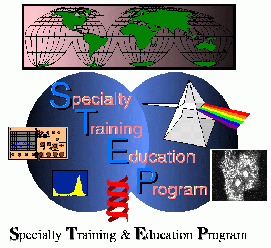 |
 |
 |
 |
 |

[Introduction to STEP]
[Table of Contents]
[STEP HomePage]
[Search for Keyword]
Purdue University Cytometry Laboratories Purdue University 1515 Hansen Hall, Room B050 West Lafayette, Indiana 47907-1515
1. Facilities available: 4000 square foot facility containing instrumentation lab, animal room (mice/rats), general biology lab, computer facilities, tissue culture facility, office space for visiting scientists.
2. Instrumentation:
Confocal & image analysis instruments: Bio-Rad MRC 1024 UV/vis confocal microscope system mounted on a Nikon 300 inverted microscope; system has heated stage for physiological studies, heated objectives; timecourse software for kinetic studies; Bio-Rad Viewscan 250 linescanning confocal microscope mounted on either a Nikon 200 inverted scope or a Nikon labophot upright scope, Optronics DEI 470T fluorescence camera; PC-pentium with Optimas & Microvoxel software; Silicon Graphics Indigo 2 systems with VoxelView 3D reconstruction software; Codonics NP1600 dye sub printer; lasergraphics digital camera.
Other major equipment: Perkin Elmer spectrofluorometer (LS 50B) with 96-well fluorescence plate reader; fluorescent photomicroscope; large variety of optical filters; large range of fluorescent indicators.
Flow cytometry: EPICS Elite with innova 300 argon laser, air cooled argon, He-Ne. Also available are Epics 753 dye laser (rhodamine 6G); Epics 752 (dual argon lasers); Epics C (2 watt argon); and a BioRad Bryte HS benchtop flow cytometer, IBM PC windows-based software.
Computers & analytical: All flow cytometry data analysis systems are IBM PC-based; software includes Coulter Elite, MDADS, Phoenix software, Verity software; Lysis software; non-cytometry software expertise in graphics programs such as slide- and image-making programs - Freelance, Microsoft Powerpoint, Coreldraw; reference data base using Reference Manager containing over 10,000 references; also for 3D reconstruction on PC Microvoxel; Silicon Graphics system with VoxelView for 3D reconstruction.
3. Specialization Areas: Phagocytic cell function such as oxidative burst of neutrophils, phagocytosis, cell activation, etc . Specialty usage of several fluorescent probes of oxidation including DCFH-DA and hydroethidine. Studies using calcium probes (indo-1) by flow; endothelial-neutrophil interactions and study of adhesion glycoproteins; membrane potential; immunophenotyping. Our lab has extensive experience working with kinetic-based assays for flow cytometry, particularly measuring intracellular oxidants such as H2O2 and O2-. Image analysis-based functional studies include Ca++, FRAP, release of caged compounds, and oxidative studies.
4. Special Opportunities: The following techniques are used extensively in this laboratory. Students will be able to isolate, prepare, and run samples on one of the cytometers. Specific techniques are:
5. Special Courses Offered: Elite instrument usage; cell function studies; live cell confocal microscopy; immunophenotyping; facilities available for training on several computer analysis packages.
6. Graduate Program: Program offered in several areas using cytometric technologies related to studies of immunophysiology. Two courses are offered for graduate students (both 3 credit hours).
7. Local Accommodations: Purdue Memorial Union Club Hotel, $65.00 per night (on campus - 300 yards to lab); inexpensive local hotels as low as $120.00 per week including breakfast (4 blocks from lab).
8. Transportation: Local airport is Purdue University Airport (LAF). Closest major airport is Indianapolis (IND); limo service every 2 hours ($18 each way). 60 miles north of Indianapolis, 120 miles south of Chicago on Interstate 65.
9. Cost of Internships: Depends upon what studies are required; however, a base rate of $500.00 per week will cover most laboratory costs including basic reagents (negotiable, particularly for disadvantaged countries). This rate includes up to 10 hours of flow cytometry instrument time. The best time for internships is during the summer months (June-August). Other times by arrangement.
J. Paul Robinson, Ph.D. Professor of Immunopharmacology Director, Purdue University Cytometry Laboratories 1515 Hansen Hall, Room B050 Purdue University West Lafayette, IN 47907-1515 Phone: (317) 494-6449 Fax: (317) 494-0517 E-mail: robinson@flowcyt.cyto.purdue.edu
 |
 |
 |
 |
 |
CD-ROM Vol 3 was produced by Monica M. Shively and other staff at the Purdue University Cytometry Laboratories and distributed free of charge as an educational service to the cytometry community. If you have any comments please direct them to Dr. J. Paul Robinson, Professor & Director, PUCL, Purdue University, West Lafayette, IN 47907. Phone:(765) 494-0757; FAX (765) 494-0517; Web http://www.cyto.purdue.edu, EMAIL cdrom3@flowcyt.cyto.purdue.edu